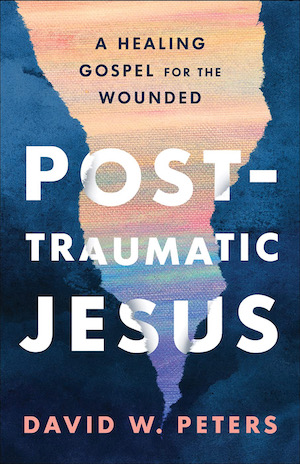You May Have a Friend with PTSD—and Not Know It
By DAVID CRUMM
Editor of ReadTheSpirit Magazine
Here’s the first reason you need to read David W. Peters’ Post-Traumatic Jesus: A Healing Gospel for the Wounded—and it’s not a book review. It’s research summarized by the National Center for PTSD, part of the U.S. Department of Veterans Affairs:
“About 6% of the U.S. population will have PTSD at some point in their lives. Many people who have PTSD will recover and no longer meet diagnostic criteria for PTSD after treatment. … About 5 percent of adults in the U.S. has PTSD in any given year. In 2020, about 13 million Americans had PTSD.
“Most of us will experience at least one trauma in our lifetime that could lead to PTSD. There are factors that put you at risk of experiencing a trauma, many of which are not under your control. For example, if you were directly exposed to the trauma or injured, you are more likely to develop PTSD.” (For more information, you can read the rest of this article on the National Center’s website.)
The point of quoting from this national research is, quite simply—
You may have a friend with PTSD
Let’s do the math: The highly respected Hartford Institute database on religion in America reports that the average attendance at the 350,000 congregations across the U.S. is 75 people. That means: If you are involved with a congregation, then it’s likely several people around you may be suffering from PTSD. In your larger community, you’ve got neighbors with PTSD.
Even if you are not suffering the effects of trauma yourself—and the majority of us are not, thank goodness—this issue nevertheless is likely close to home.
The Authenticity of David Peters’ Experiences
The author of this book we are recommending today, David W. Peters, was an enlisted Marine and an Army chaplain. He’s now the vicar of St. Joan of Arc Episcopal Church in Texas, where the congregation focuses on welcoming survivors of trauma. In the 150 pages of Post-Traumatic Jesus, this expert in PTSD explains how the Gospel stories of Jesus relate to millions of men and women who have suffered trauma.
I am using that verb “explains” rather than “interprets” the Gospels, because Peters argues—much like John Dominic Crossan and other leading Jesus scholars—that the original context of the Gospels was Roman oppression and violence. David lays out that idea in the first line of his book: “The post-traumatic Jesus is the only Jesus Christianity has ever known.” While that may not be a theme emphasized in most American congregations, it certainly is a hopeful and transformative theme preached in growing Christian communities in the Southern Hemisphere to this day. The Gospels are filled with stories of traumatized people seeking Jesus’ help—and the four Gospels end with Jesus’ own trauma and resurrection. When readers reach the letters of Paul in the New Testament, as David points out in his book, they find Paul especially focused on Jesus’ death and resurrection.
This subject is not a tangent from Scripture. The responses to trauma are right there on the pages of the Bible that are read in churches every Sunday, David explains.
His opening chapter begins with the story of the Annunciation from Luke, the story of the angel Gabriel announcing to Mary that she will give birth to Jesus. David explains the relevance this way:
The world was brutal before Rome, but Rome industrialized brutality, incentivizing the rapacious and greedy to take more and more. For all those in Jesus’ day who were helpless in the face of their violations, the story of the Annunciation is a story where the God of power and might waits patiently for the answer of a young woman in an obscure town called Nazareth. Like the ER doctor, God offers a relationship of participation to Mary, and to us as well.
In 30 short chapters, Peters takes us through some of Jesus’ parables, Jesus’ encounters with people seeking his help, Jesus’ crucifixion and resurrection.
Reclaiming that core message can be as powerful today in helping people find hope and resilience as it was 2,000 years ago, David tells us.
I agree. This is a must-have volume for pastors, small-group leaders, chaplains and anyone who cares about the lives within their families, their local congregations and their surrounding communities.
The Need to Find Such Resources for Congregations
For our ongoing special attention to these issues in ReadTheSpirit magazine, I have to credit my son in law the Rev. Joel Walther—who is now the Director of Benefits and Coordinator of Human Resources for the Michigan Conference of the United Methodist Church.
During the years Joel served as the pastor of several United Methodist congregations in Michigan, he continually tried to find helpful resources for members he knew were suffering from various traumas, including critical mental health issues. In 2018, Joel convinced me to report a Cover Story on David Finnegan-Hosey’s groundbreaking book, Christ on the Psych Ward. Then, two years later, Joel helped me with another cover story on Finnegan-Hosey’s follow-up book, Grace Is a Pre-existing Condition. Earlier this year, Joel helped me to select several more books on related topics, including our coverage of Charles Kiser and Elaine A. Heath’s new book Trauma-Informed Evangelism, Cultivating Communities of Wounded Healers.
And, now, Joel has helped me with this cover story on David W. Peters’ book. (Plus, if you read to the end of this column, you will learn that David Peters’ has another related book coming out this autumn—so stay tuned for that.)
‘Presence has a power to heal’
Compared with the other books on related themes that we have covered in recent years, Peters brings a unique authenticity. “Ever since I came back from the Iraq War, I’ve read Scripture through a post-traumatic lens,” he writes.
“I also appreciate that you have a pastoral voice throughout this book,” said Joel in our Zoom conversation with Peters about this book. “As a pastor myself, I am always trying to figure out how to help people move forward from trauma. And, I keep asking: How do we do that in a way that is helpful for that person? For example, I was particularly struck that at the end of Chapter 11 you write about a particular parable you offer to readers, then you end the chapter with: ‘There is much more to say, of course. However, there is enough in this parable to get you through the rest of the day. There is enough here to survive.’ I appreciate that as a pastoral response. Often, our first pastoral response is to try to resolve everything right away.”
So, Joel asked David to talk more about that insight in his book—how accompanying people who have experienced trauma is a long journey.
David said, “When Jesus comes back after the resurrection, the emphasis is on his presence among his followers. His spirit will be with them. The emphasis is on: You’ll never be alone. I will stay with you. And that’s so important. … If someone does decide to come into the church, we all need time to let that person feel the love of the community. Jesus taught us that presence has a power to heal—and that takes time.”
We Are Not Alone
We are not alone. This theme of presence within a caring community also is a central theme of Greg Garrett’s new novel Bastille Day, which we featured in a June 2023 cover story. The main character in that novel is a repeatedly traumatized TV war correspondent, Calvin Jones.
In that earlier cover story, we explained that Greg researched all of his fictional characters’ lives before completing his novel, including talking to his friend David W. Peters about PTSD. Peters’ own experiences as a Marine and Army Chaplain mirror some of Calvin Jones’ hard-earned wisdom in the novel.
“Greg and I talked as he was writing Bastille Day,” Peters told us. “And, now that I’m reading his book myself, I can see some of what we talked about reflected there. For veterans I’ve known, myself included, combat trauma opens a much deeper wound inside us that is unable to be healed or medicated or numbed in the normal ways people do. In Bastille Day, Greg really captures the way that kind of trauma affects relationships and our ability to function in the world.”
“Now, in your book,” I asked. “What do you hope readers will discover?”
David summed up his answer as: “The message of the Gospels that has given people hope and resilience for 2,000 years.”
“As pastors and as people who care about our congregations, we’ve got to make this message simple again,” David said, “and that should not be difficult, because the story of Jesus’ death and resurrection in the Gospels is real simple. It’s mostly the story of what Jesus is doing, what’s happening with the people around him and what people heard from hm before and after the resurrection. Through it all, we find hope. And, that’s a story that’s just as compelling today as it was back then.”
.
Care to learn more?
Order a copy of Post-Traumatic Jesus in paperback or in the Kindle edition from Amazon.
You also can pre-order David W. Peters’ book, coming out in November, on a related theme: Accidental—Rebuilding a Life after Taking One. In this November book, David explores the concept of “moral injury” and focuses on accidental deaths, including accidental deaths on America’s highways. Once again, this new book offers a unique perspective on a pastoral issue rarely explored by other authors. Stay tuned to ReadTheSpirit, as well, because we will feature another interview with David this autumn to discuss this upcoming book.
You can learn more about the church startup David W. Peters is leading in Texas by visiting the congregation’s website.
There’s a helpful definition of PTSD at the National Institute of Mental Health website.
Finally: Want a fact sheet to share with others in your congregation? The Centers for Disease Control offers an easy-to-print, 2-page PDF titled “Coping with a Traumatic Event.”



Peters reminds people of faith the need for both understanding & persistent presence with persons with PTSD. This diagnosis may stigmatizes and further isolate persons most in need of engagement. Peters affirms it is not something that quickly goes away but rather requires patience and caring persons. How grateful I am for persons who know “accompanying people..is a long journey.” I experienced a horrific car accident, suffering extensive, life-threatening injuries. I’ve learned to mitigate panic attacks, meditation and breath work. There are still unexpected triggers. Faith and assurance that “Best of all, God is with us,”(John Wesley) benefits. Faith embraces suffering, not quick answers or easy remedies.